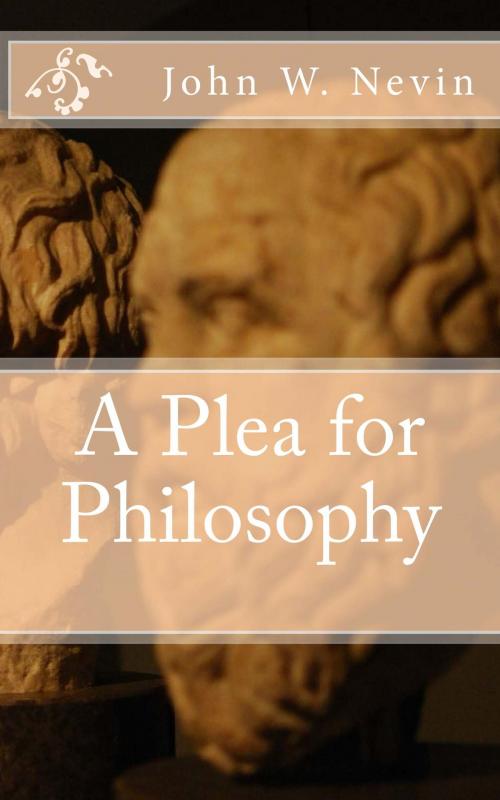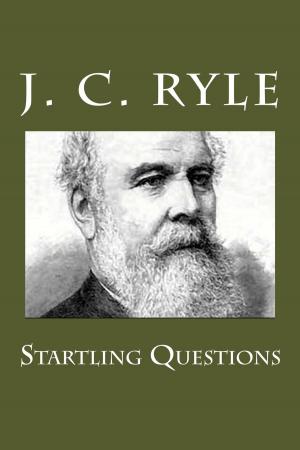A Plea for Philosophy
Nonfiction, Religion & Spirituality, Christianity, Christian Literature, Philosophy| Author: | John Williamson Nevin | ISBN: | 1230001944693 |
| Publisher: | CrossReach Publications | Publication: | September 30, 2017 |
| Imprint: | Language: | English |
| Author: | John Williamson Nevin |
| ISBN: | 1230001944693 |
| Publisher: | CrossReach Publications |
| Publication: | September 30, 2017 |
| Imprint: | |
| Language: | English |
SOME will have it, that all philosophy is vain; and that the time bestowed upon it, in our colleges and elsewhere, is only wasted, or worse than wasted in the pursuit of a phantom that can never be reached, while it leads us away continually from the proper use of life. What men need in this world, we are told, is not speculation, but an active apprehension of the living realities with which they are immediately surrounded, and the proper practical use of these for the ends of their own existence. The world is a fact, broadly and palpably spread out before our senses; and our life is a fact, which we are required to turn to right account, by making the best of it for ourselves and others, in the circumstances in which we may happen to be placed. Why, then, should we occupy ourselves with things that lie wholly beyond the sphere of our actual existence, and that can only serve to disqualify us for understanding and using the world as it is? The sense of the world is sufficiently clear of itself for such as are disposed to take things just as they are, without troubling their heads about what they are pleased to call its inward spiritual constitution and design. We have had ample experiment besides of the vanity of philosophy, in the past history of its own achievements. The world has been philosophizing since the days of Pythagoras at least, and from a still earlier date, and yet to what has it come in the end? Has its philosophy made it any wiser or better? Has it accomplished any solid gain whatever for the human race? Is the world improved in any respect by the long exploded systems of Greece, by the profound lucubrations of the schoolmen in the middle ages, or by the vast upheavings of thought which have had place since the days of Immanuel Kant, in the modern metaphysics of Germany? Is it not, in fact, a history of contradictions and confusions, from beginning to end—one system continually surmounting another, only to be as certainly overwhelmed after the same fashion, in its turn? It will be time enough to challenge our respect for philosophy, when phylosophy shall have come to some proper understanding, in the first place, of her own mind and meaning. When she shall have become once mistress of herself—a house no longer divided against itself, the very cavern of Æolus where all pent up minds are struggling perpetually in fierce conflict—it will be time enough to think of proclaiming her mistress of the world. Till then, let her be remanded to her proper dwelling place in the clouds, the land of far-off shadows and dreams. The world has too much serious business on hand, to be interrupted by her pretensions, and may reasonably say, in the language of Nehemiah to Sanballat and Geshem the Arabian of old: “I am doing a great work, so that I cannot come down; why should the work cease, whilst I leave it and come down to you?”
SOME will have it, that all philosophy is vain; and that the time bestowed upon it, in our colleges and elsewhere, is only wasted, or worse than wasted in the pursuit of a phantom that can never be reached, while it leads us away continually from the proper use of life. What men need in this world, we are told, is not speculation, but an active apprehension of the living realities with which they are immediately surrounded, and the proper practical use of these for the ends of their own existence. The world is a fact, broadly and palpably spread out before our senses; and our life is a fact, which we are required to turn to right account, by making the best of it for ourselves and others, in the circumstances in which we may happen to be placed. Why, then, should we occupy ourselves with things that lie wholly beyond the sphere of our actual existence, and that can only serve to disqualify us for understanding and using the world as it is? The sense of the world is sufficiently clear of itself for such as are disposed to take things just as they are, without troubling their heads about what they are pleased to call its inward spiritual constitution and design. We have had ample experiment besides of the vanity of philosophy, in the past history of its own achievements. The world has been philosophizing since the days of Pythagoras at least, and from a still earlier date, and yet to what has it come in the end? Has its philosophy made it any wiser or better? Has it accomplished any solid gain whatever for the human race? Is the world improved in any respect by the long exploded systems of Greece, by the profound lucubrations of the schoolmen in the middle ages, or by the vast upheavings of thought which have had place since the days of Immanuel Kant, in the modern metaphysics of Germany? Is it not, in fact, a history of contradictions and confusions, from beginning to end—one system continually surmounting another, only to be as certainly overwhelmed after the same fashion, in its turn? It will be time enough to challenge our respect for philosophy, when phylosophy shall have come to some proper understanding, in the first place, of her own mind and meaning. When she shall have become once mistress of herself—a house no longer divided against itself, the very cavern of Æolus where all pent up minds are struggling perpetually in fierce conflict—it will be time enough to think of proclaiming her mistress of the world. Till then, let her be remanded to her proper dwelling place in the clouds, the land of far-off shadows and dreams. The world has too much serious business on hand, to be interrupted by her pretensions, and may reasonably say, in the language of Nehemiah to Sanballat and Geshem the Arabian of old: “I am doing a great work, so that I cannot come down; why should the work cease, whilst I leave it and come down to you?”















